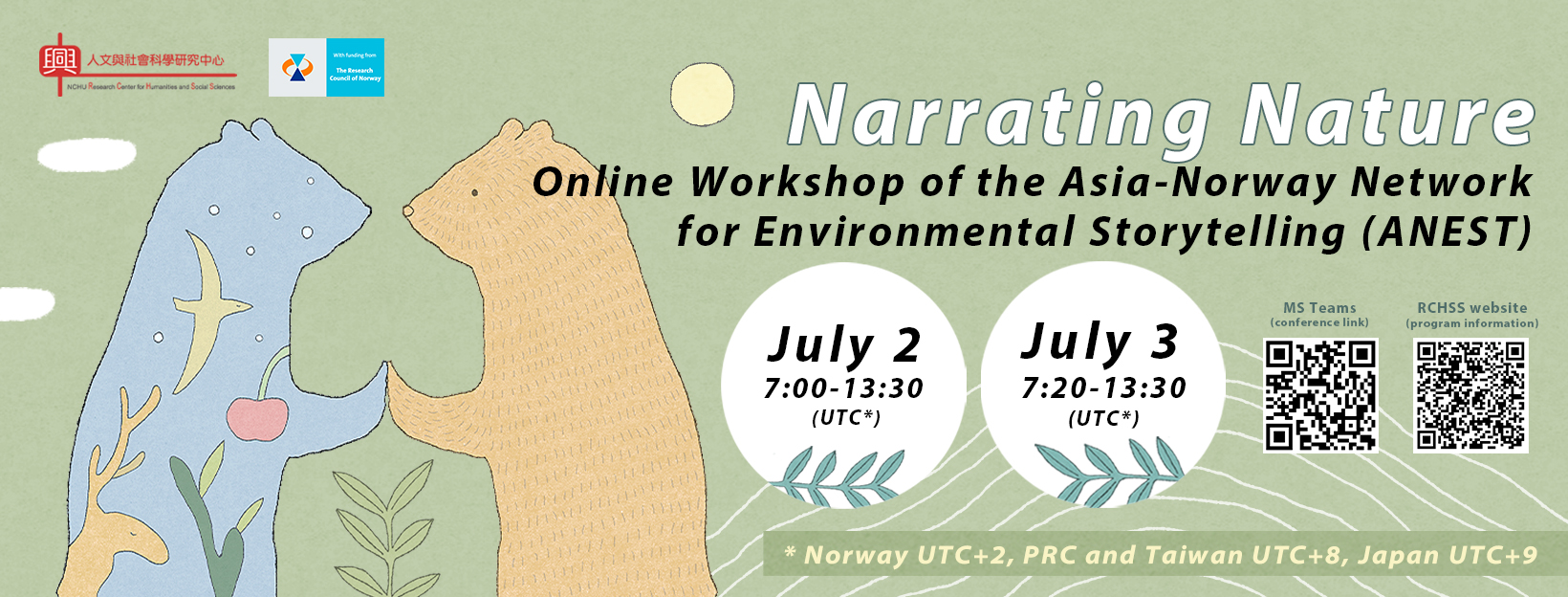July 2-3, 2021
An international online workshop of the Asia-Norway Network for Environmental Storytelling, hosted by the Department of Foreign Languages and Literatures at National Chung-Hsing University, Taichung, Taiwan
If there are such things as anthropological universals, the human propensity to tell stories must surely count among them. As Roland Barthes remarks in one of the foundational texts of structuralist narratology, “there is not, there has never been anywhere, any people without narrative”: “Like life itself, it is there, international, transhistorical, transcultural.” Because narratives surround us like the air we breathe, they are often difficult to get into focus. They come to us as spoken or written words, as images both static and moving, even as tactile markings. Narratives animate news reporting and courtroom proceedings, academic discourse and religious sermons, high school textbooks and political campaign rhetoric, popular songs and casual gossip. In all their forms, stories draw us in with the promise of meaningful order. They appear to us as bearers of truth or agents of manipulation – and we express our assent to and our distrust of them by telling yet more stories.
The many different areas of inquiry which together constitute the environmental humanities converge in the effort to understand how narratives shape the relationships of human collectives to their biophysical environment. Some of the most influential scholars in the field have described the ecological crises of modernity as a product of narratives that blind humans to their implication in the natural world or instilled a false self-image in them, or they have argued that “better” stories might help restore us to our proper place in the web of life. But how do we distinguish between “good” and “bad” stories if the criteria for assessing them are themselves inherent in the stories we tell about ourselves?
All presentations will be delivered online, with active participation limited to ANEST affiliates. Panels will be scheduled only between 7am and 1pm UTC to allow participants in Asia and Europe to attend all sessions.
The event is open for ANEST members. For more information on how to attend the event, see http://rchss.nchu.edu.tw/2021/06/20210702.html or follow the QR codes in the event poster.
Program
All times below are UTC time (Norway is +2, China is +8, Japan is +9. This means that we start at 9am in the morning in Norway; 3pm in China and 4pm in Japan.
Friday, July 2
| 7:00 – 7:20 | Welcome and opening remarks |
| 7:20 – 8:20 | Panel 1 – Jenny Leigh Smith (Hongkong University of Science and Technology), “Sound and Narrative in Li Ziqi’s Videos” – Mehdi Torkaman (University of Stavanger), “Scrolling through solar futures: Reflecting upon the affordances of the internet as a tool for collective world-building” Moderator: Shen Hou (Renmin U). |
| 8:40 – 9:40 | Panel 2 – Elin McCready (Aoyama Gakuin University) and Elis Ottosson (Gothenburg University), “Pattern as Narrative: The Structure of Botanical Stories” – Astrid Møller-Olsen (University of Stavanger), “Trees Keep Time: An Ecocritical Approach to Literary Temporality” Moderator: Masami Yuki (Aoyama Gakuin U) |
| 10:00 – 11:00 | Panel 3 – Conrad Carl (National Taiwan University), “Hydrographia: Water’s Writing in Chang Rae-Lee’s On Such A Full Sea” – Zarkamol Munisov (Shanghai University), “Ecopoetics as a Prism of the Anthropocene: The Aral Sea Crisis in Contemporary Russian Poetry” Moderator: Hanna Musiol (Norwegian U of Science and Technology) |
| 11:00 – 12:00 | Lunch / dinner break |
| 12:00 – 13:30 | Discussion: “What is Environmental Storytelling?” |
Saturday, July 3
| 7:20 – 8:20 | Panel 4 – Winnie Yee (University of Hongkong), “Manufacturing Environmental Imaginations: An Analysis of Eco-documentaries in the Age of Asia” – Berit Huntebrinker (University of Agder), “Narrating Environmental Citizenship: an Econarratological Analysis of Human-nature Relationships in Norwegian Picturebooks and Comics” Moderator: Dolly Jørgensen (U of Stavanger) |
| 8:40 – 9:40 | Panel 5 – Fiona Law (University of Hongkong), “A Tale of Two Bears: Narrating the Anthropocene between the (In)Visible and the Viral” – Verity Burke (University of Stavanger), “Re-Creation Taxidermy and the Tall Tale of the ‘Authentic’ Animal Specimen” Moderator: Lingjing Wu (Renmin U) |
| 10:00 – 11:00 | Panel 6 – Iris Borowy (Shanghai University) “Shifting Narratives of Human Waste Disposal” – Masami Yuki (Aoyama Gakuin University), “Thinking Like Uranium: Planetary Imagination Toward Nuclear Waste.” Moderator: Finn Arne Jørgensen (U of Stavanger) |
| 11:00 – 12:00 | Lunch / dinner break |
| 12:00 – 13:30 | Concluding discussion |
